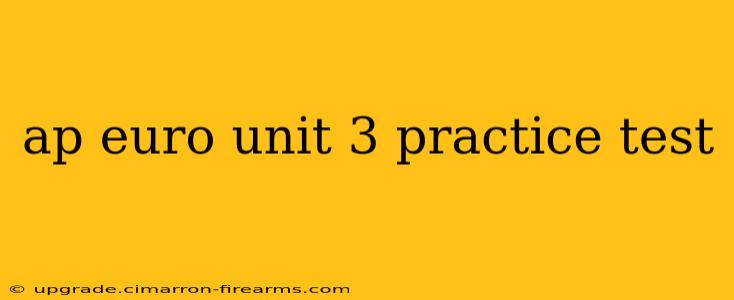Unit 3 of AP European History covers a pivotal period: 1789-1848, encompassing the French Revolution and the rise of Napoleon, as well as the subsequent reactions and changes across Europe. This practice test will help you assess your understanding of key concepts and events. Remember, success on the AP exam relies not just on memorization, but on analysis and synthesis of information.
Key Themes of AP Euro Unit 3:
Before diving into the practice questions, let's review the major themes that consistently appear in Unit 3 materials:
-
The French Revolution: Causes (Enlightenment ideals, economic crisis, social inequalities), phases (Moderate, Radical, Thermidorian Reaction, Directory), key figures (Louis XVI, Marie Antoinette, Robespierre, Napoleon), and lasting impact. Understanding the complexities of this period is crucial.
-
Napoleon Bonaparte: His rise to power, military campaigns (Italian campaigns, Napoleonic Wars), the Napoleonic Code, and his eventual downfall. Analyze his impact on Europe: both positive (legal reforms, spread of ideas) and negative (wars, authoritarianism).
-
Congress of Vienna: The goals of the Congress (restoration of monarchies, containment of revolutionary ideas), key players (Metternich, Castlereagh, Talleyrand), and the long-term consequences of its decisions. Consider how it shaped the political landscape of 19th-century Europe.
-
Rise of Conservatism and Liberalism: Understand the core tenets of each ideology and how they manifested in different European nations. Consider how these contrasting philosophies shaped political debates and conflicts during this period.
-
Nationalism: The emergence of national identities and movements, its role in revolutionary uprisings, and its impact on the map of Europe. Analyze how nationalism both unified and divided different groups.
-
Industrial Revolution's Early Stages: While the full impact of the Industrial Revolution is covered in later units, its early developments in Britain and their initial effects on society should be understood within the context of this period.
AP Euro Unit 3 Practice Questions:
(Note: These are sample questions; your actual AP exam will vary significantly.)
1. Which of the following was NOT a major cause of the French Revolution?
(a) Enlightenment ideals emphasizing liberty and equality. (b) Widespread famine and economic hardship among the peasantry. (c) The strong and unified support of the French monarchy. (d) The rigid social hierarchy of the Ancien Régime.
2. The Reign of Terror is most associated with which phase of the French Revolution?
(a) The Constitutional Monarchy (b) The Directory (c) The Girondin phase (d) The Jacobins
3. The Napoleonic Code is best described as:
(a) A series of military strategies used by Napoleon. (b) A comprehensive legal system that unified French law. (c) A set of regulations controlling French trade. (d) A secret police force used to suppress dissent under Napoleon.
4. The Congress of Vienna aimed primarily to:
(a) Spread revolutionary ideals across Europe. (b) Establish a lasting peace and restore the old order after Napoleon's defeat. (c) Promote the growth of nationalism throughout Europe. (d) Empower liberal and democratic movements.
5. Which of the following best describes the concept of Metternich's conservatism?
(a) Support for revolutionary change and popular sovereignty. (b) Emphasis on individual rights and liberties. (c) Belief in traditional institutions, monarchies, and the suppression of revolutionary ideas. (d) Advocacy for democratic reforms and representative government.
Answer Key and Explanations:
(Provided upon request - To encourage active learning, we recommend you attempt the questions before looking at the answers.)
Strategies for Success on the AP European History Exam:
- Develop a strong understanding of chronology: Understanding the sequence of events is critical for analysis.
- Master key terms and concepts: Utilize flashcards and practice questions to reinforce your knowledge.
- Practice analyzing primary sources: The AP exam often includes document-based questions (DBQs).
- Develop strong essay-writing skills: Practice writing essays that incorporate historical evidence and analysis.
- Focus on causation and consequences: Explain the reasons for events and their long-term impact.
- Don't just memorize—understand the why behind historical events.
This practice test is just a starting point. Supplement your preparation with thorough textbook readings, class notes, and additional practice resources. Good luck!

